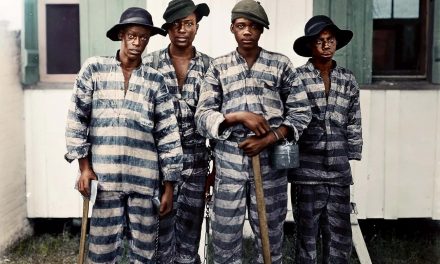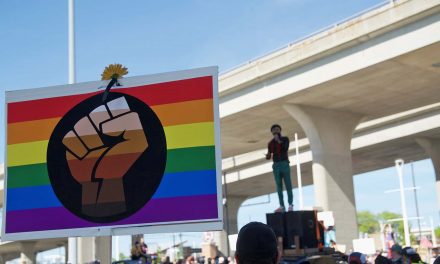
Reggie Jackson details the institution of racial discrimination that White Americans continue to ignore or support. This feature is part of a special series of articles that takes a closer look at the issue of Racism in the United States, understanding what Racism is and its social impact, along with exploring the conditions of Racism in Milwaukee’s culture. http://mkeind.com/systemicracism
“When a man with every qualification is refused a position simply because his great-grandfather was black, there is not a ripple of comment or protest. Long before the depression Negroes in the South were losing “Negro” jobs, those assigned them by common custom-poorly paid and largely undesirable toil, but nevertheless life-supporting…Negroes are now restricted more and more to common labor and domestic service of the lowest paid and worst kind…For many years it was the theory of most Negro leaders that this attitude was the insensibility of ignorance and inexperience, that white America did not know of or realize the continuing plight of the Negro. Accordingly, for the last two decades, we have striven by book and periodical, by speech and appeal, by various dramatic methods of agitation, to put the essential facts before the American people. Today there can be no doubt that Americans know the facts; and yet they remain for the most part indifferent and unmoved.” – W.E.B. Du Bois, A Negro Nation Within A Nation (1932)
Americans love to brag about something they call American meritocracy. This idea posits that success is based on merit: something that is earned and justified. When we speak about what Isabel Wilkerson calls the American caste system, it is plain to see that meritocracy has in many ways been a very nuanced concept in this nation among Whites and an outright myth in the eyes and minds of many Black people.
Meritocracy:
- an elite group of people whose progress is based on ability and talent rather than on class privilege or wealth.
- a system in which such persons are rewarded and advanced:
The late, great legal scholar Derrick Bell in Ethical Ambition: Living a Life of Meaning and Worth spoke about this myth of merit in America. “We live in a system that espouses merit, equality, and a level playing field, but exalts those with wealth, power, and celebrity, however gained.”
In the great American novel, To Kill a Mockingbird, Harper Lee touched on the subject when talking about the concept of all men being created equal. “We know all men are not created equal in the sense some people would have us believe-some people are smarter than others, some people have more opportunity because they’re born with it, some men make more money than others, some ladies make better cakes than others-some people are born gifted beyond the normal scope of most men.”
There are many things in our society and in humanity in general, which give us pause when thinking about merit. One of the core principles of merit is the idea that it is earned and that some people deserve it because they have lived their life “better” than others. We are told that hard work and great study habits lead to rewards in the end.
One concept that throws cold water on the idea of merit in America is nepotism. The term is defined as, “patronage bestowed or favoritism shown on the basis of family relationship, as in business and politics.” Nepotism is sometimes frowned upon but also often ignored. Some people don’t see an issue with someone “taking care of” their family members. The idea of nepotism can be extended to how people are able to gain access to certain privileges in America. If you come from the “right” family, then doors are automatically opened for you.
We all know it happens. Many of us have seen it work in the spaces we occupy. Someone at work has received a promotion or cushy position because of their mom, dad, uncle etc. giving them access to that position. In many cases people are not bothered by this nepotism. The exception is when the person is seen as underserving and/or incompetent. They are seen to have skipped the line, which can feel very unfair. I think most of us would agree that this can at least come across as somewhat bothersome.
Looking at it another way, this individual did not earn what they got. Their ascension was not based on merit. We may soon forget that this person received this due to nepotism if they prove to be good at their job. However, someone who was passed over for this person may harbor resentment and indeed might never get over the fact that they had done all of the things required to earn that position.
So what happens when someone is never given an opportunity to earn a position? What does it look like when an entire class of people are denied opportunities to even get their foot in the door for generations?
In this country there has been a tradition of closing doors of opportunity for people of color for generations. As marginalized groups they still face grave obstacles in gaining access to opportunity today. This explains many of the widespread disparities within our society. At the same time, many Whites still doubt that racism and the concomitant lack of opportunity play a role in these disparities.
“What is freedom? It is the right to choose one’s own employment. Certainly it means that, if it means anything; and when any individual or combination of individuals undertakes to decide for any man when he shall work, where he shall work, at what he shall work, and for what he shall work, he or they practically reduce him to slavery.”
– Frederick Douglas, “What the Black Man Wants” (1865)
The words of some people from our past are known as evergreen —standing up to the test of time — being as true now as when they were spoken. Studying the words of Frederick Douglas, my favorite orator of all time, I find comfort in knowing how brilliant he was. The words he spoke one-hundred years before I was born, are just as true today as they were in his time.
Access and opportunity are limited in America despite what we tell children about growing up to be anything they want to be. We tell little Black children they can be the next Barack Obama, Oprah Winfrey, Dr. King, and Kamala Harris. Unfortunately, the pathway to becoming the next luminary in a chosen field is often strewn with barriers that are in some cases nearly insurmountable.
Oprah Winfrey was raised in Milwaukee for part of her life and was one of the first Black students to attend Nicolet High School in Glendale, Wisconsin, a Milwaukee suburb. She was a talented student but was troubled by the racism she perceived at the school and later finished high school in Tennessee.
Dr. King was an exceptionally gifted student and graduated from high school at the age of fifteen. He attended Morehouse College and graduated with a sociology degree when he was just nineteen. While pursuing his graduate studies at Crozer Theological Seminary in Chester, Pennsylvania he was valedictorian of his class in 1951 and was elected student body president. Dr. King went on to complete his doctoral studies by the age of twenty-five. He was by every measure, an extraordinary young man, destined for greatness.
President Barack Obama attended the highly esteemed Punahou School, a private, college preparatory school in Honolulu, Hawaii while living with his mother’s parents. He had lived with his mother in Jakarta, Indonesia from 1966 until 1971. His father, Barack Obama Sr., was born an itinerant goat herder in Kenya. He was a gifted student where described by a former principal as “the smartest boy in the school.”
He went on to eventually receive a M.A. in economics from Harvard University in 1965. President Obama’s mother born Stanley Ann Dunham was a gifted student who became an anthropologist specializing in economic anthropology and rural development of Indonesia. She received a bachelor of arts degree in anthropology, a master’s degree in anthropology and eventually a PhD in anthropology in 1992. Obama would also excel in school like both parents and learned to speak Indonesian fluently. He attended Occidental College in Los Angeles on a full scholarship beginning in 1979. He eventually transferred to Colombia University in New York where he majored in political science and English literature. He graduated with honors in 1983. He would go on tho enroll in Harvard Law School in 1988 and became the first Black President of the Harvard Law Review. After graduation he taught constitutional law at the University of Chicago Law school from 1992 until 2004.
Vice President-elect Kamala Harris was born in 1964 in Oakland, California. Her mother, Shyamala Gopalan, from a privileged elite in Hinduism’s ancient caste hierarchy received a PhD from the University of California, Berkeley. The year Harris was born her mother went on to become a biologist working in breast cancer research. Her father, Donald J. Harris, received a PhD from the University of California, Berkeley in 1966 in economics.
None of these individual fits the model of the typical Black child in America. Winfrey’s early childhood was probably most closely aligned with the experiences of many children in the Black community. I say all that to say that these exceptional individuals had advantages that allowed them to succeed against the odds in America. Oprah found her stride in high school in Tennessee after leaving Milwaukee, a place that she said left her without many fond memories. She told a reporter in 2010, “I don’t look at my time in Milwaukee with any fondness.” It often takes exceptionalism for Black people to succeed in this country. We are often told as children that we need to be twice as good as Whites to have any opportunity in the society. We can’t simply be good, we must be exceptional. Everyone has a backstory that allows you to understand their successes and failures in life better.
Communities often have unknown backstories as well. Many of the backstories for communities of color are left out of our history books. I almost always try to provide some historical context in my writings. Some people are bothered by this. They ask me why I’m bringing up “old stuff.” I say in reply that the “old stuff” helps us understand how we got here. America doesn’t like to look in the mirror because there will be very ugly things seen in the nation’s past. Events which happen in the past never happen in a vacuum. In order to clearly understand the past we need context.
Frequently the past informs us about the present. There are lines — most often not straight ones — that connect yesterday and today. The current realities and lived experiences of non-white people in America are not clearly understood by most White people in this country. Because they grow up generally in very homogenous communities, they seldom have enough background information to make sense of the lived experiences of people of color, particularly people in the Black community.
In our educational system we don’t learn the unseemly parts of American history well. These stories are mostly left out of our history books. Professor James Loewen in his book, Lies My Teacher Told Me: Everything Your America History Book Got Wrong, attempts to explain why this is the case. The publisher describes the book by saying, “After surveying eighteen leading high school American history texts, he (Loewen) has concluded that not one does a decent job of making history interesting or memorable. Marred by an embarrassing combination of blind patriotism, mindless optimism, sheer misinformation, and outright lies, these books omit almost all the ambiguity, passion, conflict, and drama from our past.”
“Whatever white people do not know about Negroes reveals, precisely and inexorably, what they do not know about themselves.” – James Baldwin (1962)
Much like Frederick Douglas, the words spoken by James Baldwin nearly sixty years ago could be spoken today and be just as true. A lot has changed in that time, but a lot has remained the same.
A well known proverb tells us that, “to the victor go the spoils.” Simply put, the winners get to tell what happened. In America, the “winners” have nearly always been those we call White. White people have told themselves and the world a version of American history which appears to justify the current state of affairs. For the most part, this version of history we all learn tells a story of meritocracy in America. Those who have had success are assumed to have earned this success. We spend years being taught about the elites and famous people of American society in school. The rough lives of average people rarely make it into our history textbooks. Patriotism is one of the aims of our education. If we learn about the triumphs of America we learn to love our country.
“In the nineteenth century and too far into the twentieth, history was consciously one-sided; it was not supposed to be even-handed but designed instead to promote patriotism and glorify the nation. These tendencies reached a kind of apogee with the overblown patriotic fervor of the First World War.” – Philip D. Curtin, Former American Historical Association President (1983)
There is an opposite side of the coin. By examining how the American caste system has prevented some from gaining the tools necessary to access the merits of society we understand our current state of affairs better. As is sometimes the case when I write about these things, someone will accuse me of being anti-white. I’m accustomed to it. It doesn’t bother me. Truth telling in America, necessitates some people looking bad. They were bad actors, therefore they look bad in hindsight. This does not mean that I have something against them. I’m simply providing analysis of the impact of their actions. They were more than the product of the time they lived in. They made conscious decisions understanding very well what the ramifications would be.
Isabel Wilkerson in her latest book Caste: The Origins of Our Discontent, talks about a caste system that separates people in this country.
“Many people may rightly say, ‘I had nothing to do with how this all started. I have nothing to do with the sins of the past. My ancestors never attacked Indigenous people, never owned slaves.’ And, yes. Not one of us was here when this house was built. Our immediate ancestors may have had nothing to do with it, but here we are, the current occupants of a property with stress cracks and bowed walls and fissures built into the foundation. We are the heirs to whatever is right or wrong with it. We did not erect the uneven pillars or joists, but they are ours to deal with now. And any further deterioration is, in fact, on our hands … Like other old houses, America has an unseen skeleton, a caste system that is as central to its operation as are the studs and joists that we cannot see in the physical buildings we call home. Caste is the infrastructure of our divisions. It is the architecture of human hierarchy, the subconscious code of instructions for maintaining, in our case, a four-hundred-year-old social order. Looking at caste is like holding the country’s X-ray up to the light. A caste system is an artificial construction, a fixed and embedded ranking of human value that sets the presumed supremacy of one group against the presumed inferiority of other groups on the basis of ancestry and often immutable traits, traits that would be neutral in the abstract but are ascribed life-and-death meaning in a hierarchy favoring the dominant caste whose forebears designed it…As a means of assigning value to entire swaths of humankind, caste guides each of us often beyond the reaches of our awareness. It embeds into our bones an unconscious ranking of human characteristics and sets forth the rules, expectations, and stereotypes that have been used to justify brutalities against entire groups within our species. In the American caste system, the signal of rank is what we call race, the division of humans on the basis of their appearance. In America, race is the primary tool and the visible decoy, the front man, for caste.”
My family was enslaved in Mississippi as I have documented in several articles. After emancipation came they were subsequently metaphorically shackled for generations. When I talk to some of the older relatives in my family I hear about these shackles. One of the saddest stories I’ve heard is about my grandmother being forced to work as a domestic for a rich White family for many, many years. They did not pay her well nor did they really treat her with respect, even though they probably thought they did.
As a Black woman living in Mississippi, her options for work were very limited. She was one of millions of Black women in this country who could only find work as domestic servants. That descriptive term “domestic” always bothered me. It does not bring to mind the humiliation and horrific nature of that forced labor. I say forced, because I’m sure that none of these women — my grandmother included — would have ever done this work if they had other choices. My mother tells me that when she was a child my grandmother, after divorcing my grandfather, worked three jobs to help support her three girls. The main job, working in the home of a White family, paid her $15 per week my mother recently recalled.
When I think about this it makes me feel very sad and disgusted. She worked for this family for years without receiving regular raises and when they came they were miniscule. In 1950 the average yearly wage in America was $3,300 and rose to $5,600 by 1960. My grandmother was making $780 per year from her main job.
I loved my grandmother like a mother. I had the good fortune of being raised simultaneously by two mothers. My grandmother was an angel in my eyes. Such a wonderful, kindhearted woman is rarely found. She was a great role model and I give a great deal of credit for who I am today to living under her guidance for many of my most formative years. I learned valuable lessons from her that I carry with me each day.
My grandmother lived most of her years inside a caste system that limited her opportunities in life. There is no doubt that she deserved better. But what she deserved did not matter in Mississippi. She got what White people there felt she deserved. She and so many other wonderful Black women over generations, got what White society decided they deserved. America told the world that they were happy, and content as domestic workers. They were neither happy nor content.
They were forced to play the same role that their forebears played during a quarter of a millennium as captive people in America. They did all of the hard work to make sure that White people could live comfortable lives. These enslaved Black women were unpaid and after emancipation underpaid. No one can accurately quantify the wages stolen from these women. No one can quantify how many of these women were sexually harassed, and sexually assaulted without any protection of the laws of this country while working behind closed doors in the homes of White people.
Part of the reason I detest the term “domestic” as it is used to describe their occupation is that it sounds like an innocent, bucolic existence, just like the word plantation is used to innocently describe forced labor camps. Their lived experiences were anything but innocent or bucolic as domestics. These women were terrorized, humiliated, abused, and never given credit for the sacrifices they made. They raised White children, nursing them while these children’s own mothers sat idly by enjoying the rewards of their White skin privilege. These Black women could not give their own children the attention they deserved because they worked such long hours nurturing White children.
These women are a symbol of the myth of meritocracy in America. They did not get what they deserved. The White people they coddled received it instead. White children and their parents were the beneficiaries of their work as well as the work of countless Black men who equally were denied opportunities for generations. Many of the privileges of belonging to the group we know as White, came to millions of immigrants from Europe but not necessarily right away. They arrived as Germans, Swedes, Poles, Italians, Greeks, Irish, and many other ethnicities but all eventually successfully became White in America.
Those of African heritage, Native Americans, immigrants from throughout Asia as well as former Mexicans, Puerto Ricans and others from Central and South America who came to be known as Hispanics/Latinos did not have the benefit of joining this exclusive White club even if their skin was white. As a result, they could not easily gain all of the advantages of America. This is not to say that all Whites gained from this system, they did not. Some — many in fact — are still waiting for their grand reward for being White in America to come. They received part of the reward but crave the rest.
America has bestowed merit and privilege to certain classes of Whites more than others. The rich and so-called “well-born” have been at the front of the line and are generally seen as examples of American meritocracy. The old-money families in this country continue to see their wealth grow generations later. They still attend the exclusive boarding schools, attend the best Ivy League universities and gain admittance not necessarily because of merit, but because of their name and prestige or financial donations they can afford to make. These exclusive schools use the benign term “legacy status” to describe this benefit.
Many years ago the Eugenics Movement, born in England, but gaining its most popularity in America and Germany, taught us that the “well-born” deserved to only breed with their kind. Eugenics was founded on the principle of “good birth.” Steven A. Farber wrote in 2008 about the role U.S. scientists played in the movement.
“Francis Galton, a cousin of Darwin, who coined the term “eugenics” in 1883 while advocating that society should promote the marriage of what he felt were the fittest individuals by providing monetary incentives. Shortly thereafter, many intellectuals and political leaders (e.g., Alexander Graham Bell, Winston Churchill, John Maynard Keynes, and Woodrow Wilson) accepted the notion that modern societies, as a matter of policy, should promote the improvement of the human race through various forms of governmental intervention. While initially this desire was manifested as the promotion of selective breeding, it ultimately contributed to the intellectual underpinnings of state-sponsored discrimination, forced sterilization, and genocide … It is important to appreciate that within the U.S. and European scientific communities these ideas were not fringe but widely held and taught in universities.”
Proponents of eugenics argued that certain people deserved the privileges they had. None of the people belonging within this frame were people of color. One of the ways they promoted a so-called negative eugenics was to forcibly sterilize over 60,000 Americans. Most of these were poor and they were often Black women. There were “Better Baby” contests held around the country, which concluded that some babies were more well-born than others. Of course they were always White babies.
For a significant period of time in the twentieth century American institutions and customs dictated that people of color did not deserve access to the so-called American dream. It has been handed to Whites for generations and we’ve been told that they deserved what they got. This was sold to us as American meritocracy. It was against the law to even promote racial equality in my home state of Mississippi.
“Any person … who shall be guilty of printing, publishing or circulating printed, typewritten or written matter urging or presenting for public acceptance or general information, arguments or suggestions in favor of social equality…between whites and negroes, shall be guilty of a misdemeanor and subject to fine or not exceeding five hundred (500.00) dollars or imprisonment not exceeding six (6) months or both.” – Mississippi’s Jim Crow Law
There is nothing meritorious about America when generations of people were and continue to be excluded from those opportunities due to belonging to groups that have not gained access to being called White and all the benefits that come along with it.
Many Americans have and continue to work exceptionally hard and deserve the rewards that come with this effort. There is no doubt that this is the case. However, we ignore to our own peril, that this system of merit and reward is colored by systemic racism and exclusionary access.
When we learn during Black History Month about the first Black person to achieve something, we are somehow supposed to ignore that fact that many others who were equally deserving did not have access to achieve the same. These so-called Black History facts yell at us that American meritocracy is a myth.
Untold human potential over four hundred years in this country has been squashed by a system that has and continues to reserve merit based in many ways on skin color.
“We do not share much in the U.S. culture of individualism except our delusions about meritocracy. God help my people, but I can talk to hundreds of black folks who have been systematically separated from their money, citizenship, and personhood and hear at least eighty stories about how no one is to blame but themselves.” – Tressie McMillan Cottom, “Thick: And Other Essays”
“What happens when people are faced with evidence that their group benefits from privilege? We suggest such evidence will be threatening and that people will claim hardships to manage this threat. These claims of hardship allow individuals to deny that they personally benefit from privilege, while still accepting that group-level inequity exists. Experiments…show that Whites exposed to evidence of racial privilege claim to have suffered more personal life hardships than those not exposed to evidence of privilege.” – P. L. Thomas, Professor of Education (Furman University, Greenville SC)
- Systemic Racism 101: Dear America, I can’t believe what you say because I see what you do
- Systemic Racism 201: The advantages Whites have felt entitled to for generations
- Systemic Racism 301: Denying that Systematic Racism is real does not change the truth of its existence
- Systemic Racism 401: The Myth of American Meritocracy














